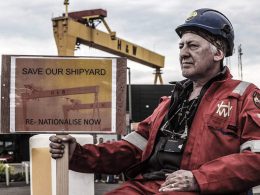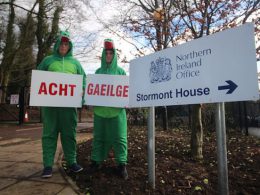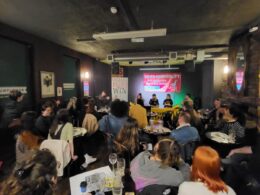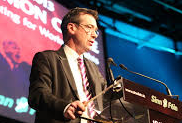To mark the second anniversary of the death of Peter Hadden, leading member of the Socialist Party and the Committee for a Workers’ International we are reprinting this eulogy to our beloved comrade.
Peter Hadden died peacefully at his home in Belfast on 5 May 2010 and was cremated at Roselawn Cemetery on 10 May. Peter, who died of cancer which he had fought every inch of the way over the previous three years, was 60 years of age.
This obituary will not do justice to Peter Hadden, no obituary could. It is based on the contributions by the following, friends and comrades of Peter, at the funeral itself and at the celebration of his life afterwards – Philip Stott (Scotland), Stephen Boyd, Lucy Simpson, Billy Lynn, Per-Åke Westerlund (Sweden), John Maguire (Visteon), Daniel Waldron, Carmel Gates, Gary Mulcahy, Peter Taaffe, Kevin McLoughlin, Ciaran Mulholland and Joe Higgins MEP.
Peter Hadden was born into a Protestant household on 19 February 1950 near Strabane, county Tyrone. He grew up there, often making trips at weekends to Donegal with his older brother David and friends, many times in the company of a young singer/song writer, Paul Brady.
At 18, Peter went to study in Sussex University. In 1968, in the context of the radicalising impact of struggles and revolutionary events internationally, not least in the North itself, Peter joined the Militant and was active there until he returned to the North on a permanent basis in the early 1970s, living mainly in Belfast for the rest of his life.
Before becoming a full time organiser for the Militant/Socialist Party, Peter worked briefly as a teacher and then for the union NIPSA, but all the time he strove to build the socialist movement. Billy Lynn, a long time member of the Socialist Party and NIPSA activist, illustrated this when he spoke at the celebration.
When Billy first met Peter in May 1975, it was a rude introduction. Peter, as a NIPSA official, had been instructed to throw Billy out of the NIPSA conference for heckling the rightwing leadership. At the same time as he dragged Billy out, Peter began a discussion with him that lasted for the next three days and which resulted in Billy joining the Militant.
When he’d come back, Militant had some connections in the North but little else. To say that building a principled socialist organisation of Protestant and Catholic workers and youth in the teeth of vicious sectarian conflict and division (five hundred people were killed in 1972 alone) was a difficult task, would be a gross understatement. At the celebration Peter Taaffe said the task Peter faced was “like trying to climb the north face of the Eiger without an ice pick”. But Ciaran Mulholland pointed out that Peter’s dogged determination and stubbornness not only ensured the establishment of the party at that time but also its maintenance since, particularly over the last difficult fifteen years.
Militant was built, patiently and on a firm political basis. It showed the potential for the broader workers’ unity that we fought for and organised in its ranks some of the very best class fighters from both Protestant and Catholic backgrounds, around a socialist programme. By the mid 1980s the Militant had built up a strong and influential base in the North through its work in the Young Socialists, in fighting for political representation for the working class and particularly through its successful industrial work and workplace interventions.
The deepening of sectarian tensions in the mid 1980s, the sell-outs of the labour and trade unions leaders in the North and Britain, later added to by the collapse of Stalinism, all opened up a protracted difficult time for the workers’ movement and for the Militant here and internationally.
However, the significant growth of Militant in the 1980s, to which Peter Hadden was crucial, is full of lessons for today and gives us confidence and a glimpse of how a socialist movement can be built in the future.
Central to Peter’s political life was his analysis, programme and interventions on sectarianism and the national question. Basing himself the ideas of the Militant, Peter developed our programme on the national question which offered a real way forward for workers and youth from both Protestant and Catholic backgrounds.
On many occasions Peter steered the organisation and activists through very difficult times. When it seemed impossible to see a way forward, for example on the parades issue, Peter saw further and clearer than anyone else and was able to advocate an approach and programme on the issue that made sense to working class people, both Protestant and Catholic. Peter’s ideas and approach have stood the test of time and are even more important today given the deepening sectarian division that has resulted from the so-called “peace process”.
Peter argued that the IRAs campaign of bombings and shootings could not achieve the objectives of withdrawal of the British army or a United Ireland. Instead Peter predicted that ultimately it would fail at a cost of enormously deepening the sectarian division in society.
Peter showed that there was a “conflict of national aspirations” in Ireland and that Protestants in the North would always oppose being part of a capitalist united Ireland as they correctly feared that they, just likes Catholics in the North, would be a discriminated against minority. Therefore the primary opposition to a united Ireland was not the presence of the British army as the Republican movement argued but the opposition of one million Protestants.
Stephen Boyd summed up Peter’s overall view with a quote from Peter’s book, Troubled Times, “Socialism means taking the major industry and all key services into public ownership and running them democratically, with need replacing profit as the motive. It means no privileged elite, only the right of people themselves to manage their own affairs. It means creating an international brotherhood and sisterhood, a unity based on respect of difference and in which all national and minority rights would be guaranteed. It is the unity of the working class, built in the struggle for such a society that will solve the national problem in Ireland.”
Peter didn’t just develop a programme on paper but fought sectarianism in practice. He and the comrades brought our programme on the national question, on fighting sectarianism, on workers’ unity on the class issues and for socialist policies, into the unions, the workplaces and the communities. Our comrades went where no one else was prepared to go to extol the ideas of workers’ unity and socialism. Sometimes what we did was frightening but that fear was always eased because Peter was standing beside you.
While the cynics and the bureaucrats said that bringing politics into the movement would make divisions worse, the ordinary workers consistently supported our approach of class unity and our campaigns which served to strengthen the movement and educate people that there was a real alternative to the sectarian parties.
Peter and our comrades in NIPSA were critical in establishing the tradition of workers striking against threats or attacks from paramilitaries. Many such strikes took place and were essential in forcing the trade unions to organise mass mobilisations of the working class which, at critical stages, exerted the decisive pressure on the sectarian forces and paramilitaries and prevented the North from tipping over into a civil war. In 1996 when the IRA broke their ceasefire, Peter’s and the party’s slogan of “No Going Back” was taken up by working class people throughout the North.
Peter’s writings on the national question constitute an important deepening of the understanding of Marxism on this vital issue. They include: Common Misery Common Struggle (1980), Divide and Rule – Labour and the partition of Ireland (1980), Beyond the Troubles (1994), Troubled Times – The National Question in Ireland (1995) and Towards Division Not Peace (2002).
Peter was editing an unpublished book at the time of his death. It deals with the period of 1968 to 1972 and attempts to help workers and young people learn from the mistakes of the past, particularly the rotten role of the leadership of the trade unions, so that they will not be repeated.
During the Troubles, Northern Ireland was a huge issue internationally with many forces on the left seduced into supporting the campaign of the Provisional IRA. Generations of CWI members went into battle on this important issue in their respective labour movements with confidence because they were armed with Peter’s brilliant explanations and clear analysis.
Peter’s approach on the national question has also directly assisted socialists and activists in dealing with national or ethnic division in many places including Belgium, Sri Lanka, Kashmir, Scotland and even China, to name just a few. The first material to be translated into Chinese by the China Worker website was Peter’s writings on the national question.
Peter was a theoretician but he was no stuffy academic. He was an activist in the workers’ movement with an unrivalled record of struggle. Peter developed a deep understanding of Marxism and its method because he tried, tested and honed it in the most extreme of conditions. He saw the unity between theory and action and could quickly draw practical political conclusions and identify the necessary next steps even when the political issues were extremely complex. Peter had a great feel for events, struggles and moods of the working class and could get the most from every experience and these gave him the tremendous power of insight and clarity, which proved vital in many struggles and industrial battles down through the years.
Gary Mulcahy particularly highlighted Peter’s role in the six year battle for justice of the Belfast Airport strikers against the UNITE union, whose official had colluded in their sacking. Against much criticism from within the official layers of the trade unions, the Socialist Party and Peter in particular, made a stand with these workers and helped them in their battle.
The pickets and actions of the workers made this an issue in society but Peter’s intervention was crucial. Through public activities and by the leaflets and press statements that he wrote, sometimes on a daily and weekly basis, Peter publicly exposed the role of the union and over a long time created irresistible pressure that forced them to make a settlement. It was like a game of chess, Peter and the workers against the UNITE bureaucracy with all its resources. Every move they made, Peter blocked them until they had to give in. The story of this important victory is contained in the pamphlet, Defending real trade unionism – A reply to Unite leaders’ slanders and lies written by Peter in 2008.
John Maguire, the senior shop steward in the Visteon occupation of last year was very warm in his praise of Peter and Susan. He said that while many had tried to claim credit for the settlement, it was the workers themselves and the Socialist Party who really achieved the victory. “I’ll always personally be grateful for Peter and Susan and everybody in the Socialist Party for the help they gave me. Every time I go home and see my family and kids, I know who helped me at least hold onto the life I had before Visteon closed the factory.”
While based in the North, Peter also played a unique role in the party in the South. He was active in every election campaign that we fought and gave very important advice in all the major battles we have been involved in, including the Bin Tax, the GAMA struggle and the strike of the staff at BATU in Dublin, to name some from recent years.
Peter was always available to give assistance and advice, including for Joe Higgins, particularly in the ten years when Joe was “the real opposition” in the Dail. In summing up the celebration of Peter, Joe said that Peter had been the giant at his and our collective shoulder for decades.
Peter was a founding member of the Committee for a Workers’ International (CWI) in 1974. As a leading member of the International, Peter made many important political visits to different sections including Italy, Nigeria, Israel and Palestine, Czech Republic, Greece, Scotland, Australia, Belgium and the USA.
The positive impact that Peter had on many of the comrades and sections of the CWI is immeasurable. Per-ÅkeWesterlund, representing Rättvisepartiet Socialisterna, the Swedish section of the CWI, said that Peter was extraordinary and that during a minute’s silence of respect at their national committee recently, many of the comrades had tears in their eyes. Per-Åke remembered Peter’s visit to Sweden in the early 1980s and a point that Peter had made about leadership and authority, that authority can’t be asserted, that it only comes from the quality of your political input, authority is earned! Peter Hadden has a special position in the hearts and in the minds of the members of the CWI.
Peter loved football and was a keen Northern Ireland supporter. He loved the genius of George Best, who he said wrote poetry with his feet. Peter loved to see young working class people finding outlets for their talents beyond the oppression and drudgery that daily life under capitalism can be.
Peter was a great cook and loved reading widely, from anything political, all the way to Swedish crime novels. Music was a vital part of Peter’s life. He was an enthusiastic fan of Paul Brady, Van Morrison, Bob Dylan and in particular Steve Earle. The last concert he went to was Steve Earle in Belfast last September. Peter had taken enough drugs to kill an elephant, just to quell the pain, but he wasn’t going to miss that concert.
Despite his huge achievements, Peter remained a very modest and unassuming person. When speaking at the crematorium Philip said that on his death, Peter wanted the facts and only the facts of his life and work to be outlined. He didn’t want any pomp or exaggeration, Peter thought false praise would distort and belittle him. That that was Peter’s attitude is a mark of the man.
Peter led by example, displaying again and again the selfless sacrifice for the cause and for his comrades that only great leaders can show. Peter was honest and very straight and when politically necessary, could be very sharp or pointed. But fundamentally Peter was very generous and giving, both in his time and assistance. Cynicism, either political or personal, was simply not part of Peter’s make up. Respect, and being positive and encouraging, particularly of young comrades, were his hallmarks. Put simply, Peter Hadden was a very developed human being, a man of politics and principle to his very core.
Like many, many other working class people Peter was a victim of a dysfunctional, capitalist health system where there are disgraceful delays in diagnosis and treatment. Peter did not deserve to suffer as he did, no one does. But while he was ill, he was also incredibly strong, dignified and his struggle to work and write till the very end was an inspiration.
Susan Fitzgerald, Peter’s partner for many years, also has all of the qualities above in spades. Susan stood with Peter, side by side and hand in hand, at the time of his greatest need, which was a huge comfort. Susan too has been an inspiration to the comrades.
Peter was a very proud father to his sons Stephen, aged eighteen and Owen, aged fifteen. We know they appreciated the wall of respect, admiration and love that they experienced at the celebration and we hope that remains as a comfort and a source of pride for them in their father. Peter is also survived by his older brother David, David’s wife Lucille, their daughter Kathy and son David and by Mary, Stephen and Owen’s mother.
Peter made an historic contribution to the cause of working class in the North and in Ireland as a whole and helped to bring Marxist understanding to a higher level in this country. He was one of the most capable leaders and advocates of the working class and of socialism to emerge on the Marxist left internationally from the radicalisation and struggles of the 1960s.
It is very unfortunate that all his life Peter was forced to struggle against the stream. Anyone who knew him would have absolutely no doubt that if confronted with mass struggle and revolutionary opportunities, that Peter would have been capable of theoretically, politically and tactically of dealing with such a situation and would have been able to play a decisive role in the fight for socialist change.
One supporter said he “would have loved to see Peter in action in the next period”. So would we all and the loss of Peter is a huge blow. But Peter has given us a living analysis and method which we can use to overcome obstacles and to build a strong movement in the months and years ahead and that is what we will do.
When Peter’s coffin was taken out of his house in Dunmurry on 10 May, it was draped with a red flag. Peter’s comrades, family and friends carried his coffin down Peter’s street and later again, carried Peter into the crematorium in Roselawn. Before Peter’s coffin was lowered, we saluted our comrade by singing the Internationale, the anthem of the international working class, to whom Peter had dedicated his whole life. Thank you Peter for your incredible life.












